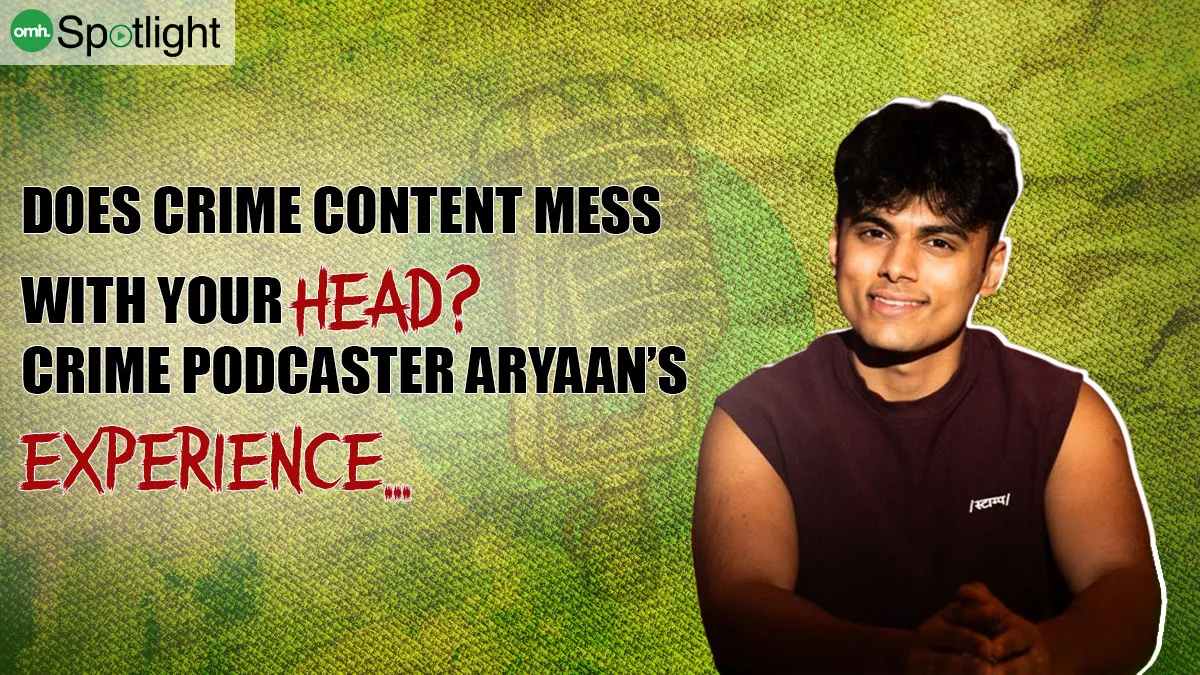
Are you a sucker for crime stories and love bingeing on them? There are so many people out there who love to consume crime-related content, especially intriguing true crime stories. Obsessing over such content can become overwhelming sometimes which may leave a negative impact on your mental health. In an exclusive conversation with Onlymyhealth, Aryaan Misra, the co-host of The Desi Crime Podcast reveals the perks and perils of regular consumption of crime content and some tips on how you can enjoy crime content without it taking a toll on your psychological and emotional health.
Table of Content:-
Getting Heavily Invested In Some Stories Is One Downside of Producing Crime Content: Aryaan
Expert Speak: Can consuming crime content regularly affect mental & psychological health
I personally do not consume true crime outside desi crime: Aryaan
Expert Tips To Prevent Mental & Psychological Harm if You Love Bingeing True Crime
CHECK YOUR
MENTAL HEALTH

How do crime stories affect the mind of a crime podcaster?
“Listening to these stories almost feels like at least you are safe. You know all the bad stuff is happening somewhere else to someone else while you know, you're in the confines and the safety of your house. And maybe that's what makes some people feel peaceful after listening to these stories,” shares Aryaan Misra.
What Is Mean World Syndrome and Its Link with Mental Health
Overconsumption of crime content can mess with your health. In order to understand the influence of true crime on mental health, we also spoke to Dr Chandni Tugnait, MD (A.M) Psychotherapist, Life Alchemist, Coach & Healer , Founder & Director, Gateway of Healing. According to her, “Mean World Syndrome describes a psychological phenomenon where extensive exposure to negative media content leads people to perceive the world as more dangerous and threatening than it actually is. This distorted worldview can develop when individuals consume a steady diet of violent news, crime reports, and dramatic content across various media platforms.”
“The brain's natural tendency to prioritize negative information, combined with constant exposure to media highlighting dangers and disasters, creates a skewed perception of reality. For instance, someone might overestimate the likelihood of being victimized by crime after regularly watching crime dramas and news reports about violence, even when living in a statistically safe neighborhood.,” she adds.
Getting Heavily Invested In Some Stories Is One Downside of Producing Crime Content: Aryaan
View this post on Instagram
Talking about instances that trigger his anxiety, Aryaan quotes, “The only downside that I've experienced in producing and consuming crime content is, just those stories which I get heavily invested in. But in general, they are not something that bog me down or keep my day gloomy. Also, because I focus more on the production side of the show, I don't consume true crime outside Desi crime at all because I know that if I do, I'm going to feel a little anxious.”
Also Read: Do You Indulge In Overeating When Stressed? Expert Shares How Comfort Eating Causes More Stress
Expert Speak: Can consuming crime content regularly affect mental & psychological health
According to Dr Chandni Tugnait, The human mind, while remarkably adaptable, can be profoundly influenced by the media it regularly consumes. Crime-related content, whether through news reports, documentaries, or entertainment shows, has emerged as a significant factor affecting psychological well-being in ways that often go unnoticed until they manifest in daily life.
Here are some of the major effects-
- Heightened stress response: Regular exposure to crime content keeps the brain's threat-detection system constantly activated, triggering increased cortisol production. This persistent state of alertness leads to physical symptoms like muscle tension, headaches, and disrupted sleep patterns, particularly noticed in those who consume such content before bedtime.
- Cognitive distortion development: The mind begins interpreting everyday situations through a lens of potential danger. This cognitive reshaping creates a hypervigilant state where normal scenarios trigger unnecessary fear responses, making routine interactions increasingly stressful.
- Social relationship impact: Fear and suspicion become default responses, affecting how people interact with others. Individuals might start avoiding social gatherings, limiting their children's activities, or experiencing difficulty trusting new acquaintances, creating a cycle of isolation.
- Emotional desensitization: While some become more fearful, others experience emotional numbing. This decreased sensitivity to violence can lead to reduced emotional responsiveness in general life situations, affecting empathy and emotional connections.

I personally do not consume true crime outside desi crime: Aryaan
Talking about how securing psychological health being a true crime podcaster, Aryaan says, “My Co host Aishwarya is a voracious true crime consumer and true crime doesn't disturb her like but she feels calmer as opposed to what one might think. And it's a little counterintuitive, but that's the case for many people who use desi crime and other true crime podcasts to fall asleep. What's at play there is for a psychologist to delve into, but it's something to do with the, you know, something to do with that level of adrenaline somehow working weirdly in an opposite manner.”
On being asked how to consume crime content without getting overwhelmed, Aryaan gave an interesting answer.
He shares, “After having covered more than 140 crime stories, even deep into them, researched them, crime stories do not affect us in the same way I think they might affect the average person in that we have developed a certain ability to both ingest and digest the material. And, you know, and let it be once we are done writing and narrating the story, there is some level of distancing. We as writers need to evolve in order to not be, you know, distraught by every story we cover. But of course, at the end of the day, we're humans and there are certain stories, stories that we end up researching too deeply, where we end up connecting with the families of the victims that we can't help but feel torn about.”
Expert Tips To Prevent Mental & Psychological Harm if You Love Bingeing True Crime
While crime content can be engaging and educational, protecting your mental health requires implementing thoughtful boundaries.
Here's are some tips by Psychotherapist Dr Chandni to enjoy your favorite crime shows while maintaining psychological wellness-
- Set viewing boundaries: Create specific time slots for crime content, avoiding late-night viewing that could affect sleep. Limit binge sessions to shorter durations and take breaks between episodes to process the content emotionally.
- Practice reality anchoring: After each viewing session, engage in activities that ground you in present reality. Take a walk outside, interact with family, or participate in community events that remind you of the actual safety levels in your environment.
- Balance content diet: For every crime show watched, balance it with uplifting or neutral content. This could include comedy shows, nature documentaries, or positive news stories that help maintain perspective on the world.
- Implement decompression techniques: Develop post-viewing rituals that help your mind transition away from the intense content. This might include light exercise, journaling about your thoughts, or engaging in a calming hobby.
- Monitor personal responses: Pay attention to how crime content affects your behavior and thoughts. If you notice increased anxiety, paranoia, or sleep disturbances, adjust your viewing habits accordingly. Consider taking breaks when needed and return only when you feel mentally prepared.
Also watch this video
How we keep this article up to date:
We work with experts and keep a close eye on the latest in health and wellness. Whenever there is a new research or helpful information, we update our articles with accurate and useful advice.
Current Version